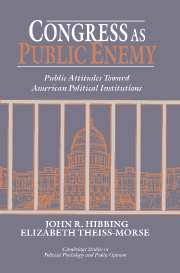Book contents
- Frontmatter
- Contents
- List of figures
- List of tables
- Preface
- CONGRESS AS PUBLIC ENEMY
- 1 Introduction: What is wrong with the American political system?
- 2 Changing levels of support for individual institutions
- 3 Perceptions of political institutions
- 4 Perceptions of congressional features and reforms
- 5 Focus groups and perceptions of the Washington system
- 6 Who approves of Congress?
- 7 Support for democratic processes
- 8 Conclusion: The people and their political system
- Appendix
- References
- Index
Preface
Published online by Cambridge University Press: 05 August 2012
- Frontmatter
- Contents
- List of figures
- List of tables
- Preface
- CONGRESS AS PUBLIC ENEMY
- 1 Introduction: What is wrong with the American political system?
- 2 Changing levels of support for individual institutions
- 3 Perceptions of political institutions
- 4 Perceptions of congressional features and reforms
- 5 Focus groups and perceptions of the Washington system
- 6 Who approves of Congress?
- 7 Support for democratic processes
- 8 Conclusion: The people and their political system
- Appendix
- References
- Index
Summary
In the space of a few weeks during the summer of 1992 we attended two very different meetings dealing with the perceived problems of Congress and the overall political system. Participants at the first meeting were congressional staffers, residents of Washington think tanks, employees of the Congressional Research Service, and university professors specializing in the study of Congress. The prevailing sentiment of this group was that while the public's perceptions of congressional inadequacies could not be ignored, these perceptions were wholly inaccurate and potentially dangerous. At one point, someone even suggested that more needed to be done to “insulate” Congress from the public. This comment drew murmurs of approval from others in the room. Much of the rest of the discussion centered around ideas such as strengthening the powers of party leaders, modifying some of the internal rules of the Senate (such as those dealing with holds – the norm allowing senators to delay voting on a bill), and perhaps altering the jurisdiction of House committees.
The second group consisted of residents of a small midwestern town. None of them had ever worked for Congress; many had never even been to Washington. They were brought together to determine what ordinary people saw as causes of and solutions to the problems of Congress and our political system. The answers proposed by these people were quite different from those of the congressional specialists. The nonspecialists believed members of Congress to be haughty, pampered, and out of touch.
- Type
- Chapter
- Information
- Congress as Public EnemyPublic Attitudes toward American Political Institutions, pp. xi - xivPublisher: Cambridge University PressPrint publication year: 1995

